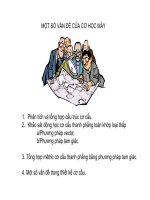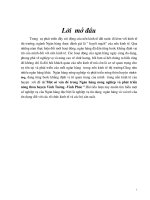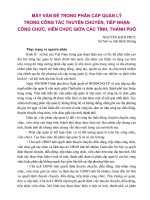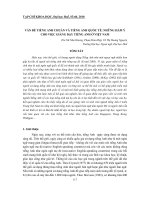Vấn đề trong anh văn2 potx
Bạn đang xem bản rút gọn của tài liệu. Xem và tải ngay bản đầy đủ của tài liệu tại đây (64.17 KB, 6 trang )
Lee Wherry Brainerd is the author of
Basic Skills for Homeschooling and Home-
schooling Your Gifted Child, and has edited
and contributed to many books on topics
ranging from healthcare to test prepara-
tion. She lives in Altadena, California.
Ricki Winegardner is the author of A
Parent’s Guide to 3rd Grade and A Parent’s
Guide to 4th Grade, and coauthor of Basic
Skills for Homeschooling. She is a producer
for AmericanBaby.com and lives in
McConnellsburg, Pennsylvania.
ABOUTTHE
AUTHORSIntroduction ix
Secret 1: Managing Time and Being Prepared 1
Secret 2: Getting a Handle on Objective Testing 13
Secret 3: Getting a Handle on Subjective Testing 33
Secret 4: Mastering Your Study Environment 47
Secret 5: Discovering Your Learning Style 59
Secret 6: Creating and Implementing a Study Plan 77
Secret 7: Getting the Most Out of Class 89
Secret 8: Mastering the Materials 101
Secret 9: Tackling Memory Tricks 117
Secret 10: Preventing Test Stress 133
Appendix A: State Board of Education Listings/Guide to
High School Exit Exams by State 143
Appendix B: Print Resources 149
Appendix C: Online Resources 153
CONTENTS
Y
our palms are sweaty, your stomach is in a knot, and you think you
feel a headache coming on. You even thought about staying in bed
today instead of going to school. No, you don’t have the flu; you
are simply on your way to take a test for which you feel ill-prepared. For-
tunately, your symptoms can be cured! Mix some preparation with a few
time management skills, wash it all down with a healthy mind and body,
and, voila, you will feel better about test taking in no time!
As a high school student, your days may seem to be filled with these
small inconveniences referred to as tests. A pop quiz in one class leads into
a major chapter test in another. Then, after you have gotten into the rou-
tine of school test taking, you will be presented with standardized testing.
Standardized tests are used by educational institutions and lawmakers to
gauge the overall proficiency of students in a given school or geographi-
cal region. Perhaps the monsters of all tests are the college entrance exams
that you have heard so much about. Examples of college entry exams
include the Scholastic Aptitude Test (SAT) exam and the ACT Assess-
ment. You are even required to take tests to enter the military or drive a
car. During these high school years, it seems that tests are becoming more
than a fact of life; they are slowly taking over many facets of your every-
day existence. In truth, tests are a fact of life, and if you lack the proper
test-taking skills, life can be difficult.
This book is designed to help you gain control over test stress and to
provide you with the skills necessary to become a more successful and
confident test taker. The ten secrets to taming even the most daunting
and stressful of tests will be revealed to you in ten easy-to-reference
chapters.
Introduction
ix
Secret #1: Managing Time and Being
Prepared
Time management is a skill that is referred to even in the corporate world.
Gone are the lazy days of childhood when morning melted into afternoon,
which somehow oozed into evening. As you and your responsibility load
have grown, so have the expectations that you will learn to manage your
time effectively. Early lessons in time management can be traced back to
when you were assigned a chore to be completed after school but before
dinner. Maybe you came home and unloaded the dishwasher immediately,
or perhaps you waited until the last possible moment before the food was
placed on the table. In either case, you were given a task and a block of time
in which to perform that task, and it was up to you to make decisions about
how you would manage your time.
Effective time management will greatly reduce the stress you feel
when walking into the classroom on test day. If you have used your time
effectively, you will have studied and prepared yourself without undue
stress.
The skill that goes hand in hand with time management is preparation.
No matter how efficient you are at managing your time, you will have dif-
ficulty overcoming hurdles if you are not prepared. Preparation means cre-
ating weekly study schedules to maximize your time. Preparation means
that you have your #2 pencil with you, if required. Preparation means that
you possess a basic idea of what to expect on the test, and it also means that
you are always ready for the pop quizzes for which your science teacher has
become famous. Effectively managing your time to prepare for an exam is
half the battle to becoming a more successful and confident test taker. For
this reason, Secret #1 pairs both time management and preparedness
together.
Secret #2: Getting a Handle on Objective
Testing
Several types of test will be administered to you during your high school
and post-high school career. You have probably already been exposed to
most, if not all, of the major styles of testing. When asked which kind of
test you prefer, you and many of your friends may answer that you prefer
objective tests. Examples of objective test questions include:
•
multiple choice
•
true or false
x
10 SECRETS TO ACING ANY HIGH SCHOOL TEST









